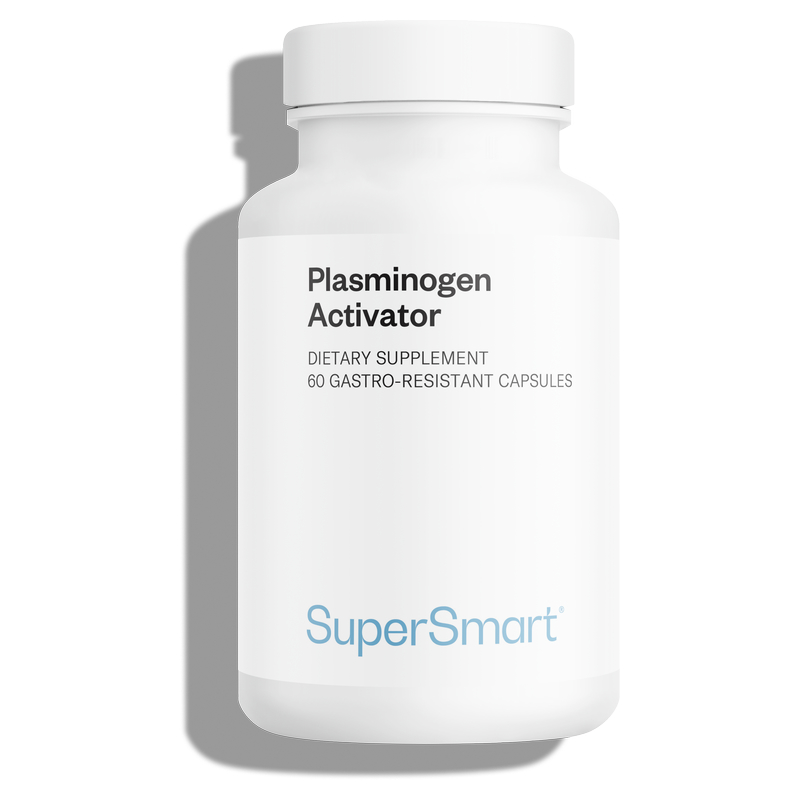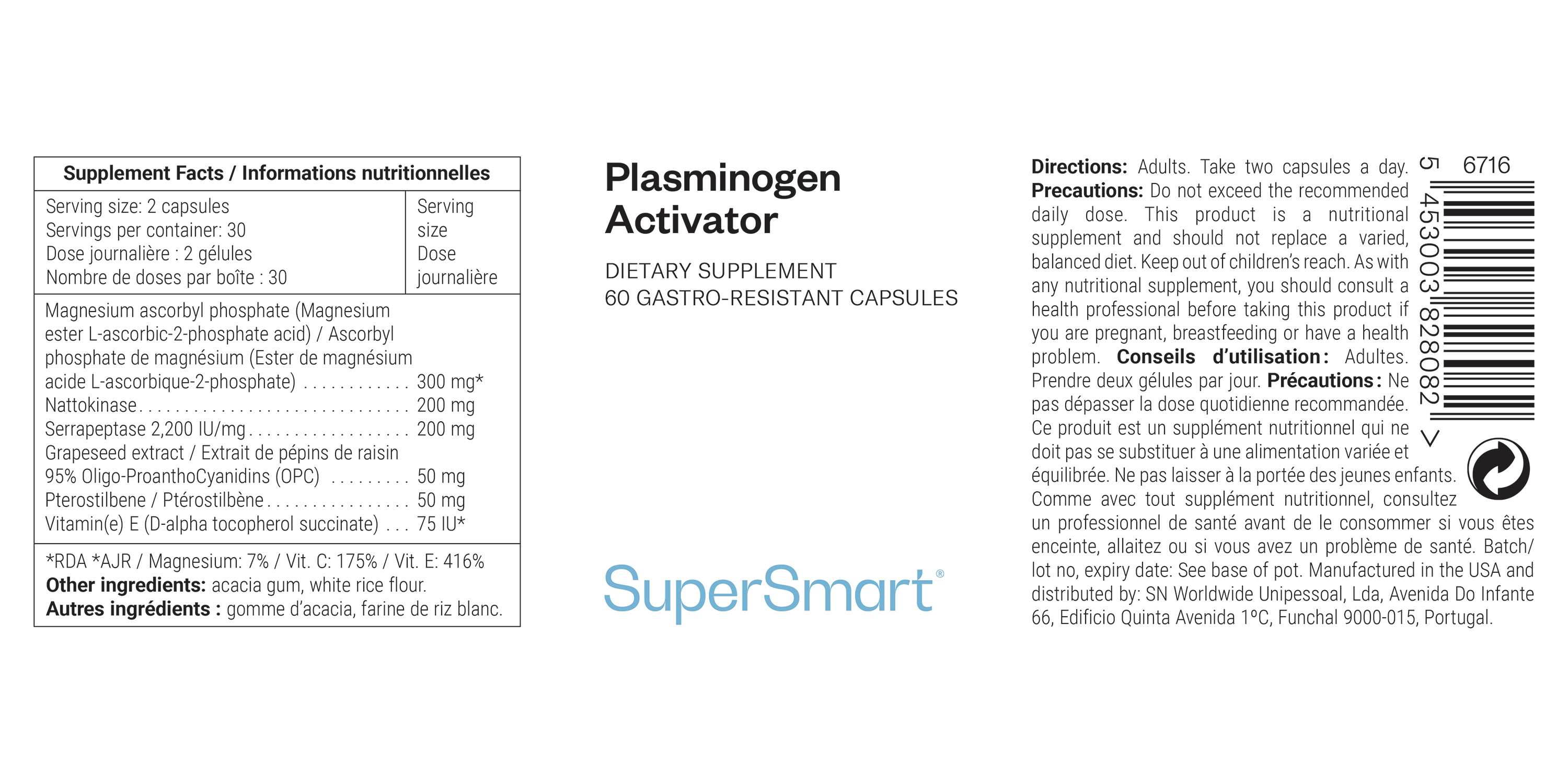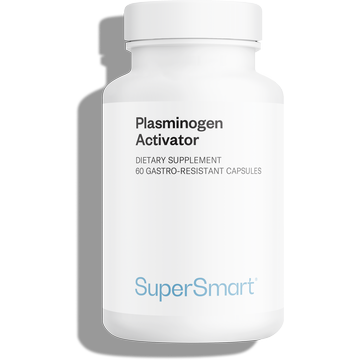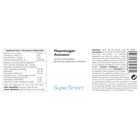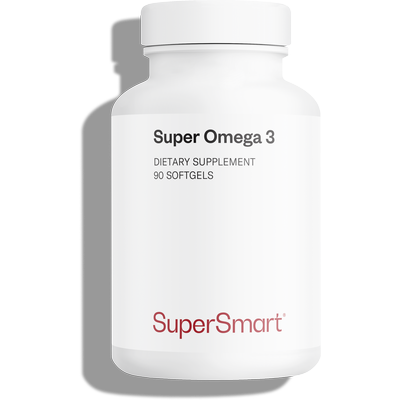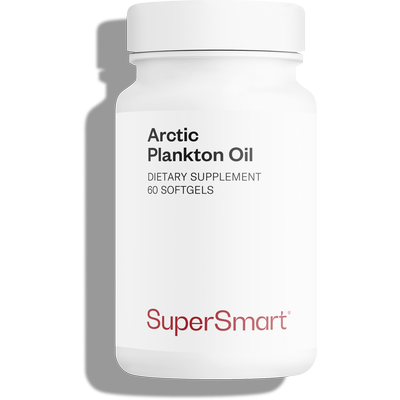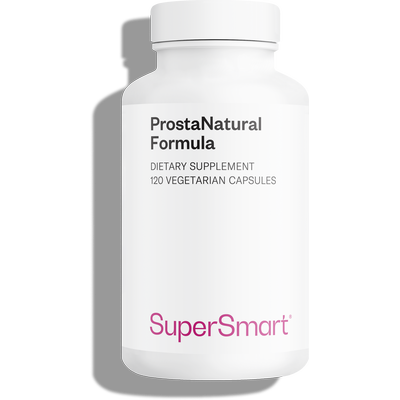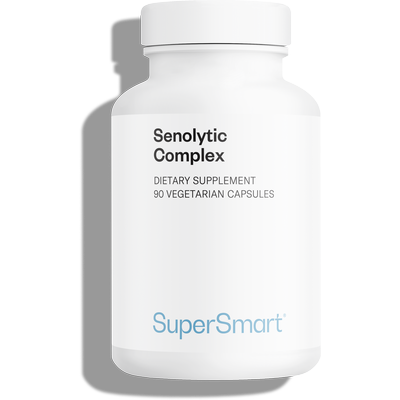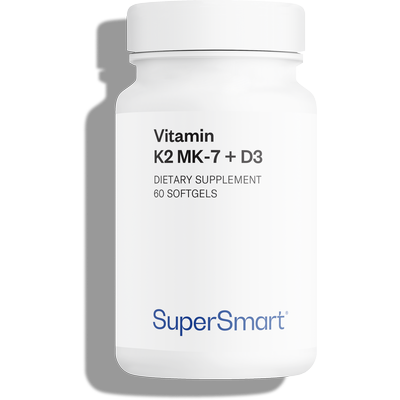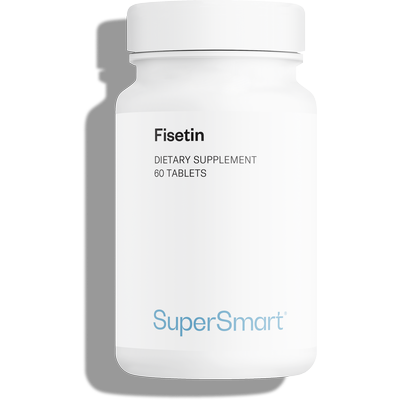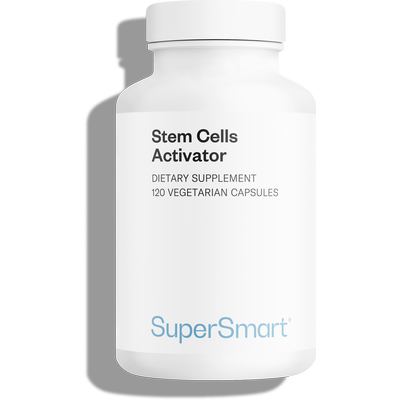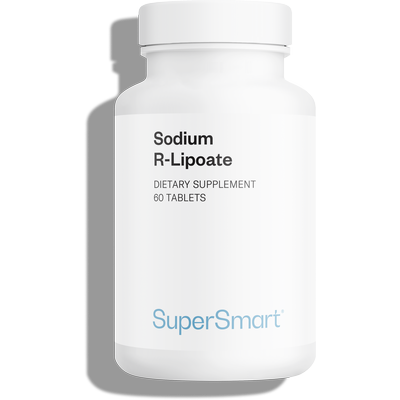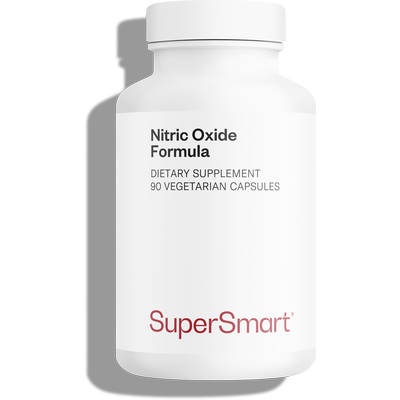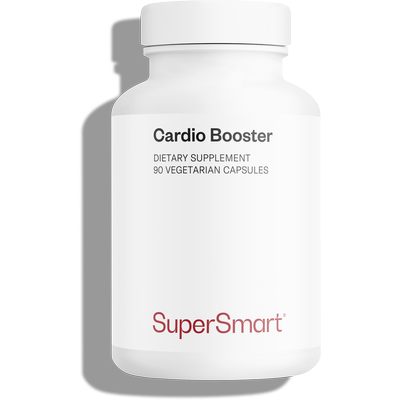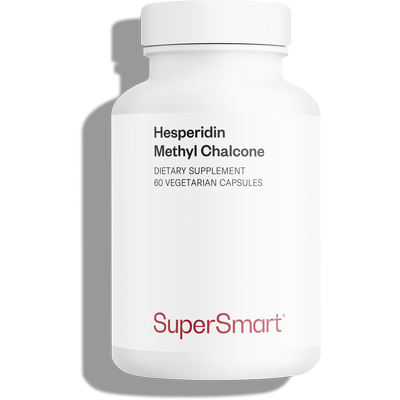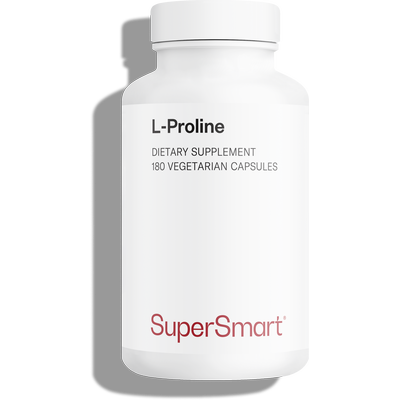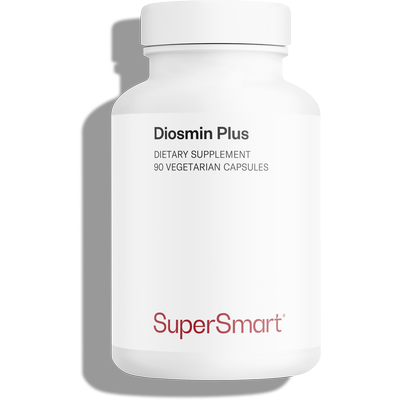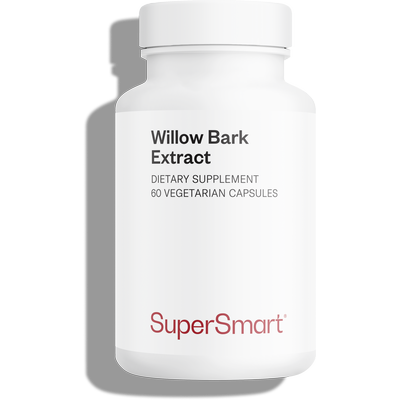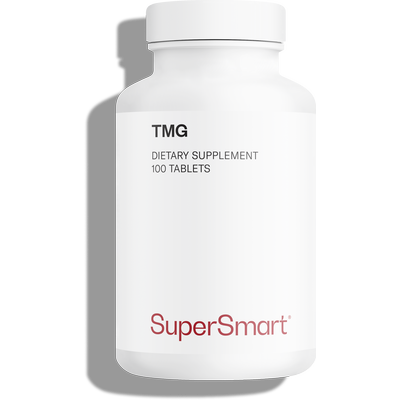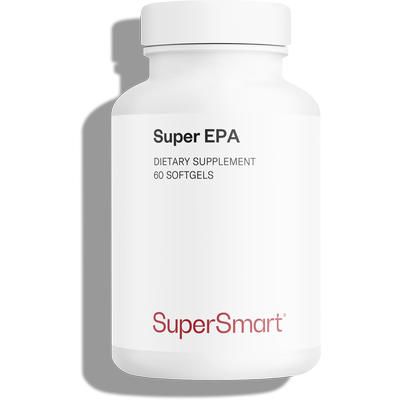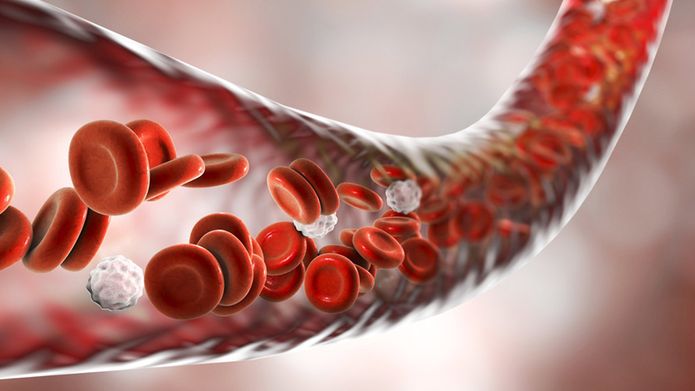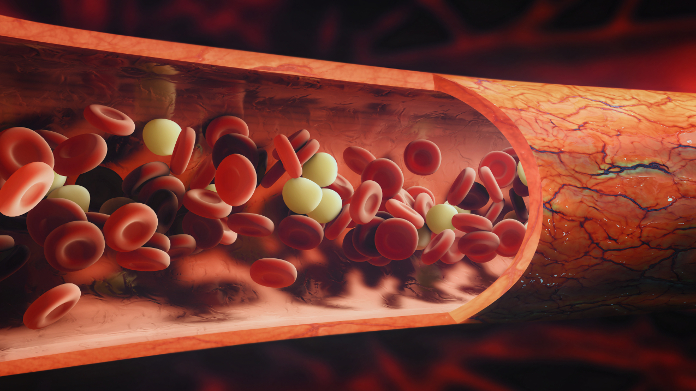Complete your selection
Plasminogen Activator is a superior quality dietary supplement which combines the best natural substances for supporting good cardiovascular health and longevity.
Its carefully-selected compounds help to prevent the formation of arterial plaque and reduce existing plaque. Certain of its ingredients, such as nattokinase and d-alpha tocopherol, are even able to directly activate plasminogen, the precursor of plasmin. Plasmin helps break down the fibrin that goes on to form blood clots (1-3). This new formulation has also been developed to promote optimal blood flow.
Plasminogen Activator also contains powerful antioxidant compounds which help protect the body from the harmful effects of oxidative stress, a key factor in cardiovascular problems and ageing (4-5).
What exactly is in Plasminogen Activator?
The exceptional Plasminogen Activator contains 6 bioactive ingredients carefully-chosen to act in synergy to protect your arteries:
- nattokinase. This is an enzyme extracted from natto, a Japanese food made of fermented soya beans. By activating plasminogen, nattokinase helps to break down fibrin, a substance that circulates in the blood and can build up to the point where it causes a blood clot to form. In addition, nattokinase helps to reduce the activity of renin, a compound that increases blood pressure. Nattokinase thus helps to both prevent the formation of clots and reduce hypertension. It also has anti-atherosclerotic properties (6-7);
- serrapeptase. This enzyme is able to break down certain proteins and is actually used by silkworms to dissolve their cocoons. In the human body, serrapeptase breaks down dead or damaged tissue. It thus helps to dissolve plaque, the harmful fibrous layer that builds up on artery walls, and clots, without affecting healthy cells. It also promotes a reduction in swelling by draining fluid that accumulates in tissues (8-10);
- grape seed extract standardised to 95% oligoproanthocyanidins (OPCs). OPCs are flavonoid polyphenols and particularly effective antioxidants. A number of studies show that OPCs also help maintain the endothelium (the layer of cells lining the interior surface of blood vessels and thus in direct contact with circulating blood) (11-12);
- pterostilbene. Found in grapes and blueberries, this super antioxidant is similar to resveratrol but is even more bioavailable. Pterostilbene helps to both prevent the accumulation of LDL cholesterol and normalise blood pressure. It also has soothing and stress-relieving effects, a significant benefit given that stress is a major factor in the deterioration of arteries and veins (13-14) ;
- magnesium ascorbyl phosphate. This rare and stable form of vitamin C is 20 times more powerful than standard forms of vitamin C. It helps to combat oxidative stress and supports production of collagen which plays a role in healthy blood vessel function (15-16)
- vitamin E, in the form of d-alpha tocopherol succinate. Several studies suggest that this natural form of vitamin E activates plasminogen and has a role in cleansing atheromatous deposits from arteries, thus preventing them from narrowing. Vitamin E is also an excellent antioxidant (17-19).
What beneficial effects does Plasminogen Activator have on the arteries?
Firstly, the nattokinase, serrapeptase, pterostilbene and d-alpha tocopherol help to prevent and eliminate the atheromatous plaque which progressively clogs up the arteries (20-23). In addition, the nattokinase and serrapeptase exert a powerful ‘fibrinolytic’ effect: they play a part in preventing the formation of blood clots or ‘thrombi’ (24-25).
Plasminogen Activator’s dual action helps reduce the risk of arterial obstruction which can cause serious cardiovascular problems such as myocardial infarction (heart attack), stroke, angina, and sudden ischaemia.
By helping to cleanse the arteries, serrapeptase and d-alpha tocopherol also have a blood-thinning effect (26-27). And nattokinase and pterostilbene help to lower blood pressure and reduce hypertension (28-29).
Lastly, as potent antioxidants, the ascorbyl magnesium phosphate, OPCs, pterostilbene and vitamin E combat oxidative stress. Several studies have shown that free radical attack on cells is strongly implicated in the development of cardiovascular disease and ageing in general (30-32).
3 additional benefits of this heart-healthy, anti-ageing formulation
In addition to these principal benefits:
- the ascorbyl magnesium phosphate in Plasminogen Activator also supports strong immunity (33);
- the nattokinase and serrapeptase may also be able to dissolve amyloid plaques (which can form in the brain and impair cognitive function) (34);
- and, according to one study, the pterostilbene may help regulate blood sugar levels(35).
How should this supplement be taken?
To benefit from all the positive effects of Plasminogen Activator, you simply need to take two capsules a day with a glass of water.
What is in Plasminogen Activator
Any questions?
There are several additional steps you can take to prevent the development of atheromatous plaque. We know these atheromas are likely to obstruct arteries over time (a process called ‘ stenosis’) but they can also become suddenly detached, causing a blood clot, which can itself block the artery (known as ‘thrombosis’. To reduce the risk of such cardiac problems, try to:
- stop smoking;
- take regular exercise;
- avoid stress wherever possible;
- eat a balanced diet(with plenty of fruit and vegetables and minimal salt and fat ...);
- reduce your alcohol intake;
- control your hypertension and monitor your cholesterol.
If you’re interested in taking other supplements to support your cardiovascular system and circulation, Plasminogen Activator can be combined with a course of Arctic Plankton Oil supplements. This nutritional gem, consisting of a zooplankton-sourced oil, is excellent for the heart. Its high omega-3 content, in particular, will help reduce hypertension, abdominal fat and cholesterol levels.
And to help you hold back the sands of time, we recommend trying an anti-ageing supplement such as Fisetin. Fisetin is an antioxidant flavonoid found at low levels in mangoes, strawberries and persimmon. This extraordinary natural senolytic promotes the elimination of senescent cells associated with ageing. Fisetin is also known for reactivating ‘autophagy’ – in other words, it helps rid healthy cells of harmful waste products.
This product’s capsules are composed of HPMC (hydroxypropyl methylcellulose), a plant substance derived from cellulose. HPMC is widely used for medicines and dietary supplements. It contains no animal ingredients, is recognised as safe by health authorities and is considered more sustainable than synthetic alternatives.
december 22 2024
november 2 2024
ce produit m'aide à équilibrer l'hypertension
this product helps me balance hypertension
 see the translation
Translated by SuperSmart - see the original
see the translation
Translated by SuperSmart - see the original
october 1 2024
Produit de qualité pour la préservation de la sphère cardiaque / circulation
Quality product for the preservation of the cardiac/circulatory system
 see the translation
Translated by SuperSmart - see the original
see the translation
Translated by SuperSmart - see the original
august 5 2024
Semble efficace sur le long terme,mais le coût un peu élevé.
Seems effective in the long term, but the cost is a bit high.
 see the translation
Translated by SuperSmart - see the original
see the translation
Translated by SuperSmart - see the original
august 1 2024
Need help?
You may also like

